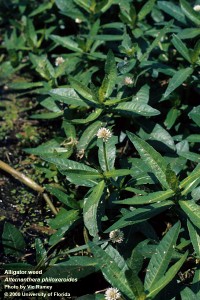National Invasive Species Awareness Week: March 3rd – March 8th
March 6th: Chinese Privet (Ligustrum sinense) & Alligator Weed (Alternanthera philoxeroides):
Video courtesy of Aquatic and Invasive Plant Identification Series by the UF/IFAS Center for Aquatic and Invasive Plants (http://plants.ifas.ufl.edu) and the Florida Fish and Wildlife Commission, Invasive Plant Management Section.
Chinese Privet: Chinese Privet is a non-native shrubby tree commonly found in forested areas in northern Florida. This eastern invader thrives in low-lying, wet areas near forest openings and fence rows. Other species of the Ligustrum genus are commonly grown in landscapes. Chinese Privet can be identified in the spring by its small white flowers which omit a foul odor. Birds easily spread this weed by feeding on and excreting the fruit which contain many seeds. Additionally, Chinese Privet can spread by underground plant structures called rhizomes which allow new shoots to sprout up from the ground from a mother plant. For control options of Chinese Privet, see http://www.gainvasives.org/pubs/gfcnew.pdf or contact your local extension agent.
For more information, contact the author Josh Thompson, Regional Agriculture/IPM Extension Agent 850-482-9620.
Alligator Weed: This highly invasive aquatic weed, which is a native of South America, was first discovered in Florida in 1894 and is believed to have been transmitted through ballast water. Alligator Weed is usually found as sprawling mats

Alligator Weed photo by Vic Ramey courtesy of UF/IFAS Center for Aquatic and Invasive Plants, University of Florida
across the surface of water. Although classified aquatic, it can be found along shorelines or dry land.
This plant is a category II invasive and also an aquatic weed. “This species is on the FL DACS Prohibited Aquatic Plant List – 5B-64.011. According to Florida Statute 369.25, No person shall import, transport, cultivate, collect, sell, or possess any noxious aquatic plant listed on the prohibited aquatic plant list established by the department without a permit issued by the Florida Department of Environmental Protection. See 5B-64.011 for more information.”
There are several biological controls of Alligator Weed, such as the Alligator weed Flea Beetle. For more information about this biological control and others, please see the following IFAS extension publication. https://edis.ifas.ufl.edu/in831 .
For more information, contact the author Matt Orwat, Horticulture Extension Agent 850-638-6180.
